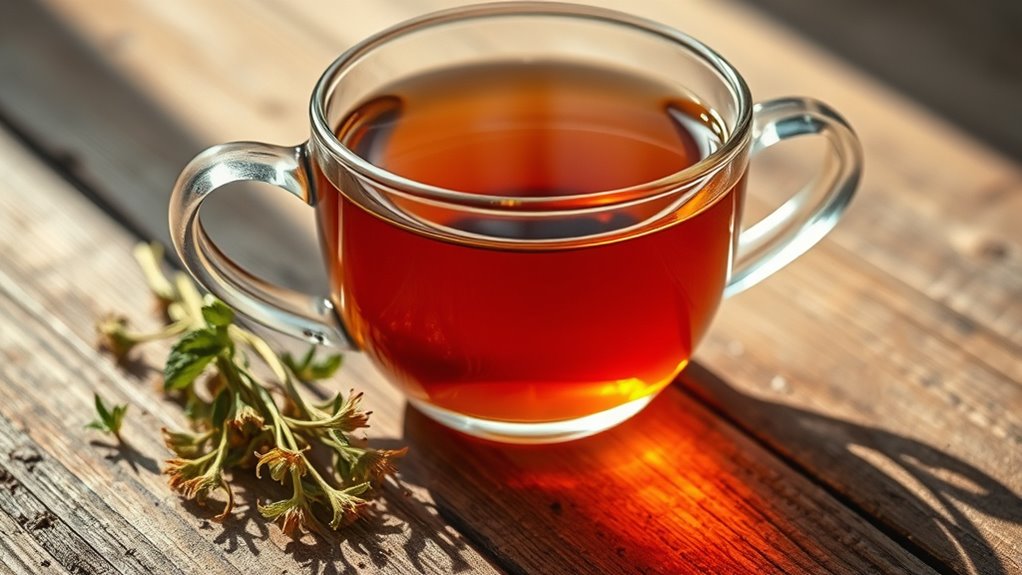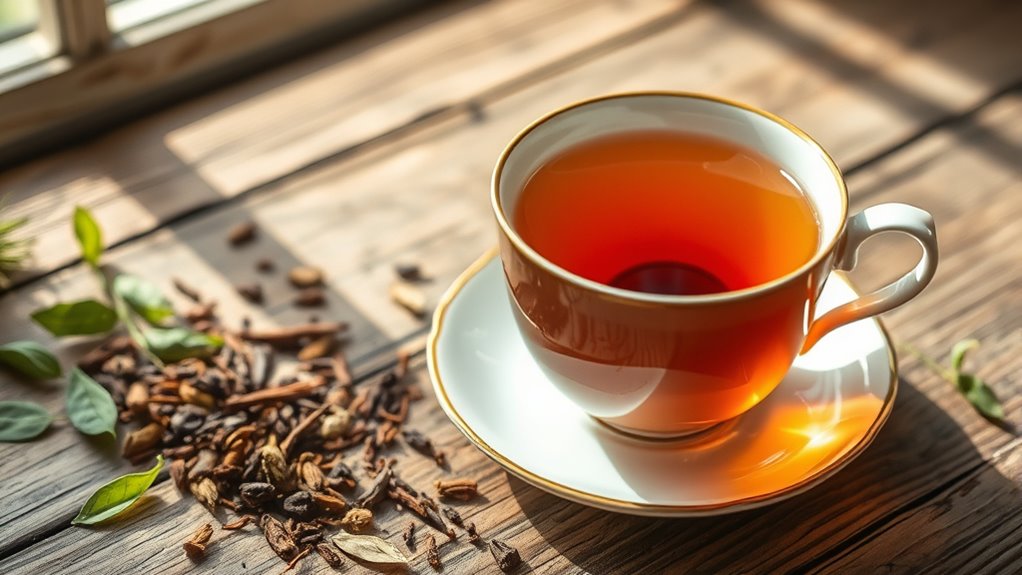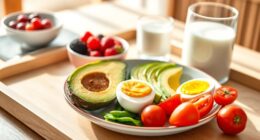Herbal teas may seem safe because they’re natural, but during pregnancy, they can hide serious risks. Contaminants like heavy metals, pesticides, bacteria, or molds can be present due to poor regulation and handling. Some herbs can cause contractions or allergic reactions, while others may interfere with hormones and fetal development. Even reputable brands aren’t foolproof. If you want to understand how to protect yourself and your baby, keep exploring these hidden dangers.
Key Takeaways
- Some herbal teas contain contaminants like heavy metals, pesticides, or bacteria, posing risks during pregnancy.
- Unregulated herbal remedies may have inconsistent quality, fillers, or adulterants that can harm fetal development.
- Certain herbs can trigger contractions or allergic reactions, increasing the risk of pregnancy complications.
- Contamination can occur during processing, handling, or storage, especially with unverified herbal tea sources.
- Always consult healthcare providers before consuming herbal teas, as even “natural” options can be unsafe during pregnancy.

Herbal teas are often seen as a natural and safe way to relax during pregnancy, but many varieties can hide hidden risks that you might not be aware of. One major concern is herbal tea contamination. Unlike regulated medications, many herbal teas are not strictly monitored for purity or safety. This lack of oversight means that teas can be contaminated with heavy metals, pesticides, or other harmful substances during cultivation or processing. Drinking contaminated herbal tea may expose you and your developing baby to toxins that could cause complications or adverse effects. For example, lead or other heavy metals in contaminated herbs could accumulate in your body over time, potentially affecting fetal development. Additionally, herbal teas may contain bacteria or molds if not processed properly, further increasing health risks.
Another issue is that herbal remedies are often unregulated, leading to variability in quality and safety. Many herbal products are marketed without rigorous testing or quality assurance, which means you can’t always be sure what you’re drinking. Some herbal teas labeled as “natural” or “herbal” could contain ingredients that are unsafe during pregnancy or that have not been evaluated for safety by health authorities. Unregulated herbal remedies can also include adulterants or fillers that might pose risks, especially when you’re pregnant. You might assume that because a product is sold over the counter or online, it’s safe, but that’s not always the case. This lack of regulation makes it easy for potentially harmful herbs to slip into products, increasing the chance of unintended side effects or interactions with other medications.
It’s important to realize that not all herbal teas are created equal. Some herbs, even in small amounts, can trigger contractions, cause allergic reactions, or interfere with hormone levels, which can be dangerous during pregnancy. Since herbal remedies are often unregulated, you can’t always rely on labels for safety assurances. Many herbal teas on the market haven’t been tested for contaminants or purity, leaving you vulnerable to hidden dangers. Additionally, herbal tea contamination can result from improper handling or storage, further compromising safety. Contaminants in herbal teas may also be introduced during processing or packaging, emphasizing the importance of sourcing from reputable suppliers. Always check with your healthcare provider before trying any herbal tea, especially during pregnancy. Opt for teas that are sourced from reputable suppliers and have been tested for safety. But even then, it’s best to exercise caution, as unregulated herbal remedies pose a higher risk of contamination and inconsistent quality, making them potentially unsafe choices during this sensitive time.
Frequently Asked Questions
Are There Any Herbal Teas That Are Completely Safe During Pregnancy?
You might wonder if any herbal teas are completely safe during pregnancy. While some herbal tea ingredients, like ginger and chamomile, are generally considered safe in moderation, pregnancy safety varies for different herbs. Always check with your healthcare provider before drinking herbal teas, as some ingredients can cause complications. Stick to well-known, pregnancy-safe options, and avoid teas with herbs that might trigger contractions or other issues.
Can Herbal Teas Affect Pregnancy Hormones or Fetal Development?
Did you know that up to 80% of pregnant women consume herbal teas? These beverages can impact pregnancy hormones and fetal development through hormonal disruption, potentially leading to complications. Some herbs contain compounds that interfere with hormone balance, risking fetal impact. You should be cautious, as not all herbal teas are safe, and consulting your healthcare provider helps guarantee your choices support a healthy pregnancy.
How Much Herbal Tea Is Considered Risky for Pregnant Women?
You should be cautious with herbal tea intake during pregnancy, as dose limits vary based on herbal potency. Generally, drinking one to two cups daily is considered safe, but exceeding this increases risk. Always check specific herb guidelines because some herbs can be harmful in small amounts. To stay safe, consult your healthcare provider about appropriate doses and herbal potency before including herbal teas in your pregnancy routine.
Are There Specific Herbal Teas to Avoid in the First Trimester?
Think of herbal tea ingredients as a double-edged sword—what’s soothing for one might be risky for another. During pregnancy safety, you should avoid teas with ingredients like chamomile, hibiscus, and licorice in the first trimester. These herbs can stimulate contractions or affect hormone levels. Always check labels and consult your healthcare provider before sipping, because some herbal teas can hide dangers behind a calming facade.
Can Herbal Teas Cause Allergic Reactions During Pregnancy?
Herbal tea allergies can occur during pregnancy, especially if you have existing sensitivities. You might experience symptoms like itching, swelling, or difficulty breathing, which indicate tea sensitivity risks. Always listen to your body and introduce new teas gradually. If you notice any allergic reactions, stop drinking the tea immediately and consult your healthcare provider. Being cautious helps protect you and your baby from unexpected allergic responses.
Conclusion
As you navigate pregnancy, remember that herbal teas can be a double-edged sword—offering comfort but hiding hidden dangers like sneaky wolves in sheep’s clothing. Always check ingredients and consult your healthcare provider before sipping. Think of it like walking a tightrope; one wrong step could tip the balance. Stay vigilant and informed to protect both your health and your baby’s future. Your well-being is the compass guiding you safely through this delicate journey.









